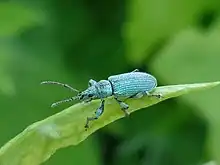| Phyllobius pomaceus | |
|---|---|
 | |
| Scientific classification | |
| Domain: | Eukaryota |
| Kingdom: | Animalia |
| Phylum: | Arthropoda |
| Class: | Insecta |
| Order: | Coleoptera |
| Infraorder: | Cucujiformia |
| Family: | Curculionidae |
| Genus: | Phyllobius |
| Species: | P. pomaceus |
| Binomial name | |
| Phyllobius pomaceus Gyllenhal, 1834 | |
| Synonyms[1] | |
| |
Phyllobius pomaceus (subgenus Metaphyllobius) is a species of short-nosed weevil commonly known as the nettle weevil.[2]
Description
Phyllobius pomaceus is a slender and elongate weevil, measuring 7–9 mm in length with bright metallic green scales, combined with variations of gold, blue and copper colour, on its elytra.[3] Larvae measure up to 8 mm in length, with a creamy white coloured body and dark head.[4]
Habitat and distribution
The beetle is associated with nettles (Urtica dioica) and Meadow Sweet (Filipendula ulmaria).[3][5] P. pomaceus can also be a pest of strawberries.[4]
Larvae live within the soil feeding on roots, adults above ground on the leaves and stems of their host plants.
References
- ↑ "Species Details : Phyllobius (Metaphyllobius) pomaceus Gyllenhal, 1834". Catalogue of Life (2017 Annual Checklist). 2017. Retrieved 2017-04-25.
- ↑ "PNettle Weevil - Phyllobius pomaceus". Nature Spot. Retrieved 2017-04-26.
- 1 2 "Phyllobius pomaceus Gyllenhal, 1834". The Watford Coleoptera Group. Retrieved 2017-04-26.
- 1 2 Alford, D. V. (2016). Pests of Fruit Crops: A Colour Handbook (2nd ed.). CRC Press. p. 166.
- ↑ "Coleoptera >> Curculionidae >> Phyllobius pomaceus Gyllenhal". BRC Database of Insects and their Food Plants. Retrieved 2017-04-25.
External links
 Data related to Phyllobius pomaceus at Wikispecies
Data related to Phyllobius pomaceus at Wikispecies- Biodiversity Heritage Library
- Fauna europaea
This article is issued from Wikipedia. The text is licensed under Creative Commons - Attribution - Sharealike. Additional terms may apply for the media files.